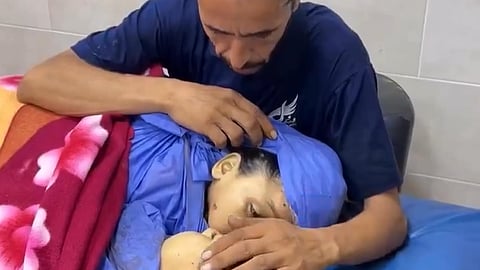Evidence Shows Israel Using Starvation to Inflict Genocide, Says Amnesty
Ongoing Starvation Crisis in Gaza Exposes Deadly Conditions
Amnesty International has reported that Israel continues to use starvation as a method of warfare against Palestinians in Gaza, in what the organization describes as a deliberate and systematic effort to inflict genocide.
Over a month after the imposition of a militarized aid distribution system led by the Gaza Humanitarian Foundation (GHF), evidence from medical staff, displaced civilians, and humanitarian workers indicates a worsening humanitarian catastrophe.
According to Amnesty, these deadly methods of distribution — combined with forced displacement, continuous bombardment, and destruction of infrastructure — are calculated to bring about the physical destruction of Palestinians.
The organization emphasizes that the aid allowed into Gaza remains drastically insufficient for a population that has endured nearly 20 months of daily attacks.
Amnesty highlights Israel’s continued restrictions on essential humanitarian items and its refusal to allow the United Nations and other relief agencies to operate freely.
The result, they argue, has transformed aid-seeking into a deadly ordeal for civilians. Hundreds have been killed or injured while trying to access aid under this militarized scheme, with Israel allegedly targeting civilians near aid convoys and distribution sites.
Children and Medical Workers Bear the Brunt
The most devastating impact has been on Gaza’s children.
As of mid-June 2025, nearly 18,741 children had been hospitalized for acute malnutrition, with at least 66 confirmed deaths from malnutrition-related conditions since October 2023.
Four-month-old Jinan Iskafi, who died from severe malnutrition in May, was among the many who succumbed to conditions that were preventable with adequate medical supplies and nutrition.
Gaza’s medical sector, already overwhelmed and under-resourced, continues to report cases of relapsing malnutrition, with some children re-admitted shortly after discharge due to the unavailability of proper food and care.
Doctors describe a grim cycle of starvation and illness, exacerbated by the destruction of farmland, poultry farms, and food production facilities.
Medical professionals themselves are displaced, malnourished, and emotionally drained.
Dr. Wafaa Abu Nimer from Nasser Hospital in Khan Younis described children suffering not only physically but also mentally, asking questions like, “Doctor, will my hair grow again? Am I still beautiful?”
These testimonies underscore the long-term physical and psychological damage inflicted by starvation, displacement, and war.
Weaponization of Aid and Global Inaction
Amnesty accuses Israeli authorities of turning humanitarian aid into a tool of oppression.
Hundreds of aid trucks remain stranded outside Gaza, blocked from entry pending Israeli approval.
Even after a partial easing of the siege in May, critical supplies such as fuel and cooking gas remain banned, crippling hospitals and life-saving services.
Aid that does reach Gaza is either funneled through the controversial GHF scheme or intercepted by desperate civilians and organized groups, further reducing access for the most vulnerable.
The failure of the international community to take effective action has enabled this crisis, Amnesty warns.
Amnesty Secretary General Agnès Callamard said:
States must cease their inertia and live up to their legal obligations. They must exercise all necessary pressure to ensure Israel lifts immediately and unconditionally its awful blockade and ends the genocide in Gaza.
The organization is calling for immediate suspension of all military support to Israel, imposition of targeted sanctions, and full cooperation with the International Criminal Court.
As Gaza’s children continue to die from hunger, the world’s silence and inaction risk complicity in what Amnesty unequivocally calls a genocide.

